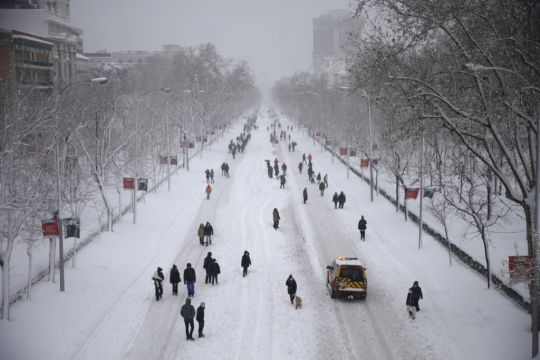A persistent blizzard has blanketed large parts of Spain with 50-year record levels of snow, killing at least four people and leaving thousands more trapped in cars, train stations and airports.
The bodies of a man and woman were recovered by the Andalucía region emergency service after their car was washed away by a flooded river near the town of Fuengirola.
The interior ministry said a 54-year-old man was also found dead in Madrid under a big pile of snow.

Meanwhile, local police reported that homeless man died of hypothermia in the northern city of Zaragoza.
More than half of Spain’s provinces remained on alert Saturday afternoon, five of them on their highest level of warning, for Storm Filomena.
In the capital, authorities activated the red alert for the first time since the system was adopted four decades ago and called in the military to rescue people from vehicles trapped on everything from small roads to the city’s major thoroughfares.
More than 20in of snow fell in the capital. By 7am on Saturday, the AEMET national weather agency had recorded the highest 24-hour snowfall seen since 1971 in Madrid.
AEMET had warned that some regions would be receiving more than 24 hours of continuous snowfall due to the odd combination of a cold air mass stagnant over the Iberian Peninsula and the arrival of the warmer Storm Filomena from the south.

The storm is expected to move north-east throughout Saturday, but it is expected to be followed by a cold snap, the agency said.
Transport minster Jose Luis Abalos warned that “snow is going to turn into ice and we will enter a situation perhaps more dangerous than what we have at the moment”.
He added that the priority was to assist those in need but also to ensure the supply chain for food and other basic goods.
“The storm has exceeded the most pessimistic forecasts we had,” Mr Abalos added.
Carlos Novillo, head of the Madrid emergency agency, said that more than 1,000 vehicles had become trapped, mostly on the city’s ring road and the main motorway that leads from the capital to the south, toward the Castilla La Mancha and Andalucia regions.

“The situation remains of high risk. This is a very complex phenomenon and a critical situation,” Mr Novillo said.
“We ask all those who remain trapped to be patient, we will get to you,” he added.
Airport operator AENA said that the Adolfo Suarez Madrid-Barajas International Airport, the main gateway in and out of the country, would remain closed throughout the day after the blizzard bested machines and workers trying to keep the runways clear of snow.
All trains into and out of Madrid, both commuter routes and long-distance passenger trains, as well as railway lines between the south and the northeast of the country, were suspended, railway operator Renfe said.
The storm had caused serious disruptions or closed altogether over 650 roads by Saturday morning, according to Spain’s transit authorities, which urged people to stay indoors and avoid all non-essential travel.
The regions of Castilla La Mancha and Madrid, home to 8.6 million people altogether, announced that schools would be closed at least on Monday and Tuesday.







